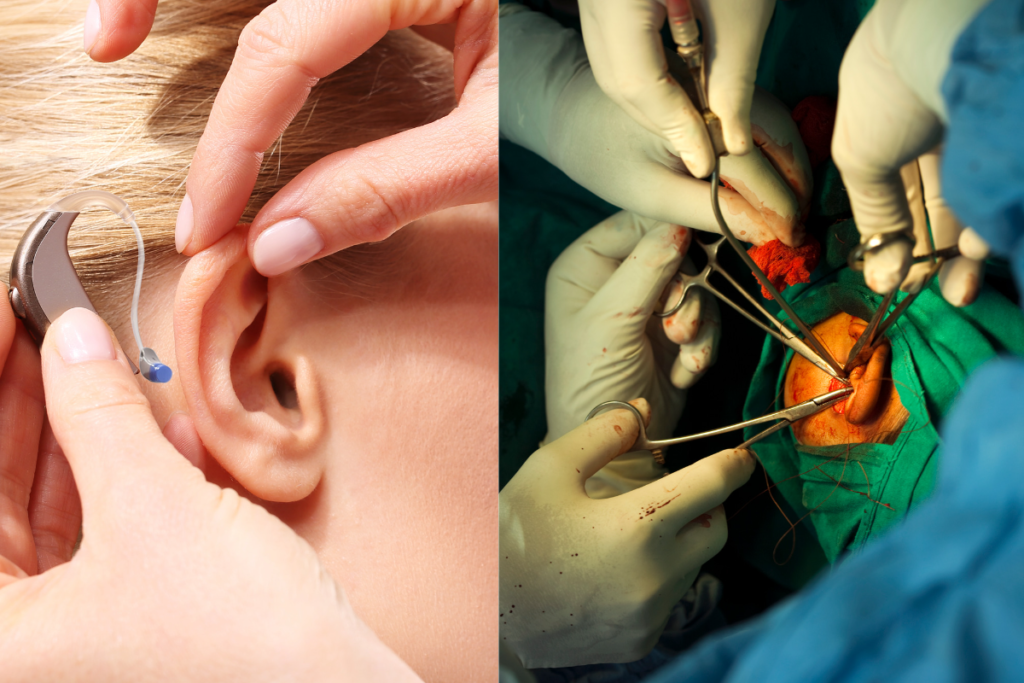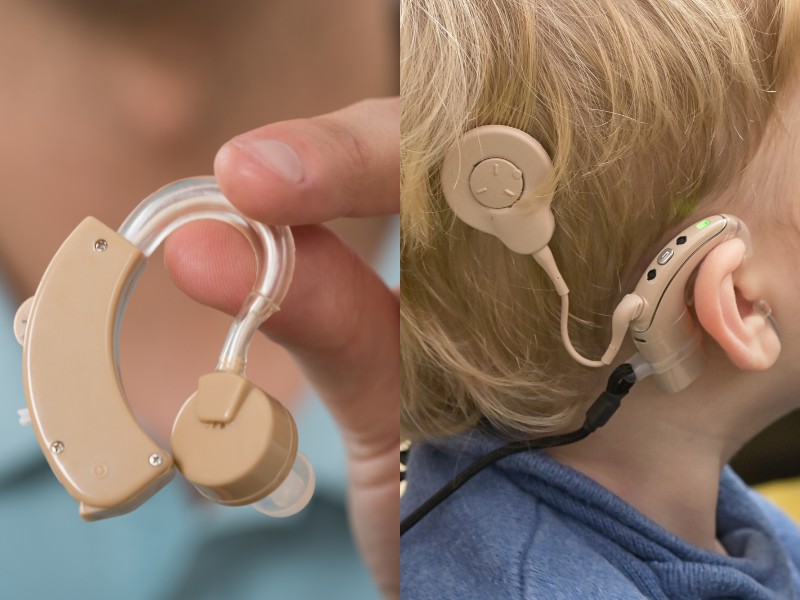Introduction
Hearing loss is a sensory loss condition in which the person finds it hard to hear sounds. According to a WHO report, nearly 63 million people in India have hearing loss. Hearing loss can occur at any stage. Causes like genetic conditions, infections, injury, and exposure to loud noises affect one’s hearing condition. A person who has hearing loss may have trouble communicating with others, feel social isolation and depression. Hearing loss significantly impacts a person’s professional and personal life by limiting their hearing ability. Doctors suggest cochlear implant or hearing aids depending on the severity of your hearing loss.
Hearing Aid In India
Hearing aids are electronic devices that amplify sound for individuals with hearing difficulties by processing incoming sound waves. The received signals are processed and made to be heard by the user. A hearing aid contains three parts, namely:
- A microphone (Receives and converts sound waves)
- An amplifier (Amplifies sound waves)
- A speaker (Sends received sound waves to the ear)
There are different types of hearing aids available to assist individuals with hearing difficulties:
Behind The Ear (BTE) hearing aids are placed behind the ear. Those who suffer from severe hearing loss need this type of hearing aid. A custom ear mould is fitted into the ear canal, and a tube joins the ear mould with an earpiece in the ear.
A Receiver In The Ear (RITE) is similar to Behind The Ear(BTE) hearing aids. In this type, the ear canal and the speaker are connected by a tiny wire. These are perfect fit for mild to profound hearing loss conditions.
An in-the-ear hearing aid is completely fitted inside the middle ear and has directional microphones and built-in volume control to improve hearing. The speaker is resistant to ear wax and is easy to handle.
In The Canal (ITC) is a mini version of ITE hearing aid. These are small, discreet and convenient to use. Due to its size, it requires extra care. People who suffer from moderate hearing loss need them. These hearing aids are more likely to be affected by earwax and moisture.
Advantages and disadvantages of hearing aids
Advantages:
- Enhances the ability to hear and distinguish sounds
- Facilitates accessible communication over the phone
- Improves communication in noisy environments
- Convenient to carry and store
- Easy to recharge or replace the battery
Disadvantages:
- Cannot restore your normal hearing
- Adjusting to a hearing aid could require several weeks to months.
- Users may find the functionality and settings confusing at first
- Digital hearing aid in India are more expensive than regular ones
Factors to consider while choosing hearing aids
There are different types of hearing loss conditions, from mild to profound. The treatment varies depending on the type of hearing loss condition. Get the right treatment and choose appropriate hearing aid.
The range of hearing aids varies depending on the technology. However, it’s important not to compromise on quality and select a device that is suitable for your needs. When choosing a hearing aid, consider both the quality and the cost, and select a device that fits within your budget while still maintaining a high level of quality.
Select a hearing aid that aligns with your lifestyle and meets your specific needs. Consider the features and settings that will benefit you and add value to your daily life. With a wide range of options available, you can find a hearing aid that is the perfect fit for you.
Hearing aids come in different sizes, go for the perfect size which suits your ear. Rechargeable ITC hearing aids are larger than other battery-operated hearing aids.
Maintaining hearing aids is arduous, so consider the ones that are easy to clean, fit comfortably in the ear with a user-friendly design. Choose rechargeable hearing aids over battery operated ones, and no need to worry about finding batteries when they run out of power.
Opt for a hearing aid that fits perfectly in your ear. Loosely fitted or tightly fitted hearing aids can cause discomfort, ear pain or injury to the ear canal. Opt for sleek and ear-friendly design to ensure your hearing aid is both effective and comfortable to wear.

Cochlear Implants
A cochlear implant is an electronic device that stimulates the hearing nerve by bypassing a damaged ear. Cochlear implant surgery can improve sound comprehension to a greater extent than hearing aids. It is surgically implanted in the ear by an ENT specialist. The device consists of an external component that is positioned behind the ear, and an internal component that is surgically placed beneath the skin.
A cochlear implant bypasses the damaged portion of the ear and directly sends sound signals to the brain. The brain identifies them as sound waves and recognises the sound. As a result, cochlear implant surgery can provide greater sound comprehension than hearing aids.
Cochlear implant surgery is recommended in the following conditions:
- Individuals who experience severe hearing loss in one or both the ears
- If hearing aids don’t improve their hearing condition
- Lost all or most of hearing
Different types of cochlear implants
Individuals who experience hearing loss due to bone conduction issues may require traditional cochlear implants. These implants help people who can hear with one ear, deformed ear canal or ears, have irritation with hearing aids, and frequent ear infections.
If you find trouble hearing low-frequency sounds like conversations, mobile ringing, TV, music, etc., then hybrid cochlear implants will help you to hear.These implants can help people who can hear high-frequency sounds like car horns or aeroplane engines but have trouble hearing low-frequency sounds. Hybrid cochlear implants work by amplifying low-frequency sounds to a certain level, allowing users to hear them more clearly.
This cochlear implant is completely fitted inside the ear. The external component is modified and fitted inside the ear canal. They are equipped with advanced technology to provide better hearing. One can hear 24/7, in sleep, during shower, swimming or riding with these implants.
Advantages and disadvantages of cochlear implants:
Advantages:
- Hassle conversations over the phone
- Hear all sounds
- No need to rely on reading lips to understand conversations
- Enjoy music over TV and radio
- Can communicate in noisy environments also
Disadvantages:
- Bleeding
- Infection
- Difficulty in sleeping position because of implant
- swelling
Factors to consider while choosing cochlear implants:
Persons who suffer from profound hearing loss conditions are suitable for cochlear implant surgery.
From young children to adults, anyone can get cochlear implant surgery. According to NICDC, children above 12-18 months of age can get cochlear implant surgery, followed by intensive
therapy will provide better results.
- People suffering from hearing loss in one or both the ears
- Who lost their complete hearing
- Rely on lip reading rather than hearing aids
- Trouble hearing with hearing aids
Lifestyle :
Cochlear implant surgery is not suitable for everyone. There are different types of cochlear implants. You should consult your ENT doctor to determine the best treatment method that fits your daily routine.
The functioning of hearing aids and cochlear implants is completely different. Hearing aids amplify sounds, whereas cochlear implants will transmit sound waves to electrical impulses.
Unlike hearing aids, which are comparatively cheaper and do not require surgical procedures, cochlear implants need to be inserted through surgery, making them a more expensive option.
The significant difference between hearing aids and cochlear implants is that a hearing aid is removable, while a cochlear implant is not. Hearing aids can be easily removed and cleaned with a dry cloth. In cochlear implant only the external part can be cleaned under the supervision of an ENT specialist.
Which is better?
Hearing aids are more suitable for mild to severe hearing loss conditions. These people have better functioning inner hair cells and benefit from sound amplification. A hearing aid is less invasive and more affordable than cochlear implants.
On the other hand, cochlear implants are better suited for individuals with severe to profound hearing loss who have non-functioning or damaged inner ear hair cells. Cochlear implants bypass the damaged hair cells and directly stimulate the auditory nerve to provide a sense of sound. They are more invasive and expensive than hearing aid in India but can provide significant benefits.
Decision-Making Process
Consulting an ENT specialist or an audiologist is the first step in identifying hearing loss conditions. By performing hearing tests and thorough examination, your doctor will decide the type of hearing loss and suggest the best treatment method. Delaying consults will decrease the chance of restoring natural hearing conditions. The time between consultation and medical treatment will also affect hearing conditions. It is essential to discuss the pros and cons of each treatment option for better and healthy hearing.
Factors to consider
Before choosing the treatment, consider the following factors and discuss with your ENT specialist:
- Extent of hearing loss
- Lifestyle
- Age
- Personality
- Any ailments that may affect post surgery
- Thyroid problems
- Blood pressure
- Meningitis
- Epilepsy
- Diabetes
Conclusion
If you are experiencing hearing loss, it is strongly recommended that you consult an ENT specialist. The doctor will suggest the best method by examining your ears, which may include the use of cochlear implant or hearing aids to restore your hearing. The earlier you seek treatment, the greater the chance of restoring your hearing. Failure to address hearing loss promptly may cause permanent hearing loss and disrupt your daily-to-day activities.

Why consult EarSurgeon, Dr. Shree Rao?
Dr. Shree Cuddapah Rao is acclaimed as one of the best pediatric ENT specialists in Hyderabad. With 10+ years of deep domain experience in the field of ENT, she is the director at Dr. Rao’s ENT Super Specialty Hospital. She underwent specialized training in Rhinoplasty / Facial Plastic surgery at Singapore General Hospital, Singapore. She also underwent advanced training in cochlear implant surgery under Padmashri Dr. Milind V Kirtane and had a Fellowship in a cochlear implant. Having performed over 200 successful cochlear implants for patients worldwide, Dr. Shree Cuddapah Rao is also the recipient of several prestigious accolades in the domain of ENT. Dr. Shree Rao is one of the best ent doctor in hyderabad, to book an appointment click here.
Are you looking for
then you have landed at right place!






